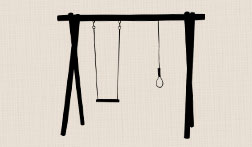Submitted by lratledge on
CRIN is campaigning for the abolition of inhuman sentencing of children, defined to include the death penalty, corporal punishment and life imprisonment. We want to emphasise that while, for the purposes of this campaign, CRIN is calling for the abolition of the juvenile death penalty, we believe that the death penalty should be abolished for all individuals, regardless of age.
While we welcome the abolition of, or moratoria on, the death penalty, we are concerned that this can lead to an increase in sentences of life imprisonment for children. As recognised by the UN Special Rapporteur on torture in March 2015, life imprisonment of children is also a form of cruel and inhuman punishment and so when the death penalty is abolished for children, the alternative must not be life imprisonment.
We welcome the recommendation in the Secretary-General’s 2016 report on the death penalty that States should immediately resentence all juvenile offenders on death row, while ensuring that these individuals do not receive life sentences in place of execution and urge the Secretary-General to continue to address the prohibition of the death penalty for child offenders within the context of achieving human rights compliant juvenile justice systems.
Legality of the juvenile death penalty
Our research indicates that in 15 countries, capital punishment remains lawful for offences committed by children, or is imposed despite being prohibited. Only five States are known to have executed a juvenile since 2005. However, as long as the sentence remains a possibility in national law, children run the risk of being executed should the situation in a given country change.
Kuwait reintroduced the death penalty for offences committed by children aged 16 or older on 1 January 2017. The reforms were introduced as a consequence of Law No. 111 which issued a new Juvenile Law. The reforms removed children aged 16 or older at the time of committing an offence from the protections of the juvenile justice system and repealed the categorical prohibition on life imprisonment and the death penalty for offences committed while under the age of 18, reintroducing both penalties for a number of offences committed by children. In March 2017, the National Assembly passed legislation to reverse these reforms, but at the time of writing, CRIN was unable to confirm when the legislation would enter into force.
The Philippines considered several bills during 2016 and 2017 that would reintroduce the death penalty in the country. The current draft of this legislation explicitly excludes people who were under the age of 18 at the time of committing an offence from the death penalty provisions.
The Maldives budgeted for the construction of an execution chamber in Maafushi Island Prison during 2016 and speaking to Maldivian newspaper, Mihaaru, in February 2017, the Minister of Home Affairs announced that the government was contemplating building a second execution chamber.
Sentences and executions between 1 April 2016 and 31 March 2017
At least three people were executed in Iran during this period for offences allegedly committed while they were children. Hassan Afshar was executed in July 2016 for the offence of lavat-e be onf (homosexual rape) allegedly committed when he was 17, though he maintained that the sexual activity was consensual. Two young men were executed in January 2017 for offences committed while they were under the age of 18. Hassan Hassanzadeh was sentenced to death for a murder allegedly committed when he was 15, while Arman Bahr Asemani was executed for a murder committed when he was 16 as well as 74 lashes for consumption of alcohol.
On 10 May 2016, Muhammad Sarfaraz was executed in Pakistan after 22 years on death row for an offence he allegedly committed while he was a child. The Justice Project Pakistan reports that there are two cases pending before Pakistan’s Supreme Court in which child offenders face the death penalty. “Moinuddin” and “Azam” were arrested in 1998, when the pair were 17 and sentenced to death in 1999 under the Anti-Terrorism Act.
Three people, Ali al-Nimr, Dawood al-Marhoon and Abdullah al-Zaher remain on death row in Saudi Arabia for offences they allegedly committed when they were children. All three were under the age of 18 at the time they were arrested and their death sentences were upheld in 2015.
The Maldives has not carried out an execution since the 1950s, but 18 people are currently on death row according to figures reported by the Maldives Correctional Service and six of these are reported to have been sentenced for offences committed while they were under the age of 18.

